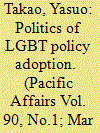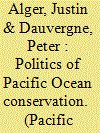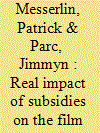|
|
|
Sort Order |
|
|
|
Items / Page
|
|
|
|
|
|
|
| Srl | Item |
| 1 |
ID:
152072


|
|
|
|
|
| Summary/Abstract |
This article will examine the determinants of LGBT (lesbian, gay, bisexual, and transgender) policy adoption in Shibuya, one of the twenty-three city wards of Tokyo, by taking an actor-specific approach to the first case of officially recognized same-sex partnership in Japan. How did the sexual minority issue become the subject of official agendas? How did actors both inside and outside the municipal government seize agenda-setting opportunities for government action? The results indicate that key policy makers’ entrepreneurship played a primary role in the official recognition of same-sex partnership by linking policy solutions with agenda-setting opportunities. This analysis demonstrates that the adoption of municipal LGBT policy does not necessarily reflect the redistribution of non-material resources, such as citizen values, but rather resembles the patterns of welfare politics.
|
|
|
|
|
|
|
|
|
|
|
|
|
|
|
|
| 2 |
ID:
152073


|
|
|
|
|
| Summary/Abstract |
Drawing on seventy-four interviews, this article analyzes the rising importance since the mid-2000s of large marine protected areas (MPAs) as a policy for managing ocean conservation. Governments have initiated eighteen large MPAs (over 200,000 km2) since 2006, reflecting the emergence of a new large MPA norm in marine conservation. This norm, we argue, emerged because of the success of a few transnational nongovernmental organizations (NGOs) in identifying politically feasible large MPAs, and then forming ad hoc domestic coalitions to lobby for them. This explanation is in contrast to most of the literature on how and why norms diffuse internationally, as well as existing explanations for the rise of large MPAs, both of which emphasize the importance of cohesive coalitions of transnational NGOs lobbying in multilateral venues. This bottom-up, international norm diffusion strategy has made large MPAs a viable policy option, one national jurisdiction at a time. For instance, this strategy was a critical element in convincing the UK to create the Pitcairn Islands Marine Reserve (835,000 km2) in 2015. Given the politics underlying the formation of large MPAs, where political gains have been high, and corporate and societal resistance relatively low, the creation of more large MPAs would seem likely, as occurred in 2016 when the UK announced it would designate three more large MPAs by 2020, totalling over 1.4 million km2. Growing support for large MPAs as a conservation strategy could also embolden states to establish large MPAs in more politically and economically contested waters, including on the Pacific high seas.
|
|
|
|
|
|
|
|
|
|
|
|
|
|
|
|
| 3 |
ID:
152074


|
|
|
|
|
| Summary/Abstract |
Many countries are becoming interested in developing their film industries as a way of promoting their national culture and increasing their soft power. With the continued global dominance of Hollywood films, policy makers are increasingly considering government subsidies as an essential tool in promoting their national film industries. However, the actual effectiveness of subsidies in promoting a film industry remains debatable. In order to better address this issue, this paper evaluates and compares the experiences of France and Korea. Both countries have adopted exactly the same sequence of instruments—import quotas, screen quotas, and then subsidies—yet have applied almost the opposite subsidy policies. Since the 1950s, France has intensively used subsidies while Korea has not. After more than a half century, these different subsidy policies have led to very different outcomes. This paper shows that a film industry without significant government subsidies can prosper better in the long term than a heavily subsidized one. This is an important lesson for countries that want to develop their film industry and to promote their culture by designing effective film policies.
|
|
|
|
|
|
|
|
|
|
|
|
|
|
|
|
| 4 |
ID:
152075


|
|
|
|
|
| Summary/Abstract |
What has shaped contemporary discourse on Japan’s comfort women issue? During the last twenty-five years, civic groups in both Japan and South Korea have made significant efforts to publicize the issue within the international community, hoping to narrow the disparity between the position of the international community and that of the Japanese government. Thus far, however, Japan’s official position has shown little change. Why has international pressure on Japan failed? By focusing on the relationship between international pressure and the formation of Japan’s discourse on the comfort women issue, this paper shows how outside pressure led to a domestic backlash among conservatives in Japan, resulting in the failure to institutionalize apologetic discourse within Japanese society. This study will provide important insights on how democratic countries can sometimes resist strong external pressure to conform to international norms.
|
|
|
|
|
|
|
|
|
|
|
|
|
|
|
|
|
|
|
|
|